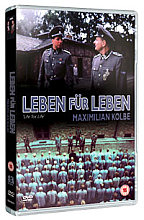Free Membership
Welcome to DVD-Movie-Sale.co.uk!
DVD Movie Sale is a comprehensive DVD site where you can search for any movie by genre, film title, actors name or director. Complete with full film information & synopsis as well as being able to compare prices for your favourite DVD from leading retail stores. You even have the opportunity to include your personal film reviews or give your personal ratings with numerous chances to win dvd related prizes.
Browse DVDs
Leben Fur Leben - Maximilian Kolbe (aka Life For Life - Maximilian Kolbe)
Leben Fur Leben - Maximilian Kolbe (aka Life For Life - Maximilian Kolbe)
 Stars: Edward Zentara, Christoph Waltz, Artur Barcis
Stars: Edward Zentara, Christoph Waltz, Artur BarcisDirector: Krzysztof Zanussi
Summary: When Jan escapes from Auschwitz concentration camp to freedom in July 1941 the camp commandant, Fritsch, sentences ten men to starvation as revenge. One of the men is Maximilian Kolbe, a Franciscan priest, who gives his own life so that his fellow inmates may live. For Jan, the horrors of Auschwitz are over - only to be replaced by a crippling fear and guilt from which there is no escape.
St. Maximilian was born Raymond Kolbe in Poland, January 8, 1894. In 1910, he entered the Conventual Franciscan Order. He was sent to study in Rome where he was ordained a priest in 1918. Father Maximilian returned to Poland in 1919 and began spreading his Militia of the Immaculata movement of Marian consecration (whose members are also called MIs), which he founded on October 16, 1917. In 1927, he established an evangelization center near Warsaw called Niepokalanow, the "City of the Immaculata." By 1939, the City had expanded from eighteen friars to an incredible 650, making it the largest Catholic religious house in the world.
To better "win the world for the Immaculata," the friars utilized the most modern printing and administrative techniques. This enabled them to publish countless catechetical and devotional tracts, a daily newspaper with a circulation of 230,000 and a monthly magazine with a circulation of over one million. Maximilian started a shortwave radio station and planned to build a motion picture studio--he was a true "apostle of the mass media." He established a City of the Immaculata in Nagasaki, Japan, in 1930, and envisioned missionary centres worldwide.
Maximilian was a ground-breaking theologian. His insights into the Immaculate Conception anticipated the Marian theology of the Second Vatican Council and further developed the Church's understanding of Mary as "Mediatrix" of all the graces of the Trinity, and as "Advocate" for God's people.
In 1941, the Nazis imprisoned Father Maximilian in the Auschwitz death camp. There he offered his life for another prisoner and was condemned to slow death in a starvation bunker. On August 14, 1941, his impatient captors ended his life with a fatal injection. Pope John Paul II canonized Maximilian as a "martyr of charity" in 1982. St. Maximilian Kolbe is considered a patron of journalists, families, prisoners, the pro-life movement and the chemically addicted.

WIN DVDS by being amongst the first to review this DVD. Reviewing DVDs earns you bonus entries and lets you WIN DVDs!Please login before reviewing this DVD. If you're a new user, register for free and enter to WIN FREE DVDs!

| Aspect Ratio: | 4:3 |
| Main Language: | English |
| Region: | Region 2 |
| Special Features: | Subtitles On Or Off, Scene Selections, Web Link |
| Subtitles: | English |
| Year: | 1991 |
| Release Date: | October 6, 2008 |
| Runtime: | 90 minutes |
| Certification: | |
| Catalogue Number: | E K A 40079 |
| Keywords: | Subtitled, Life, General, Fit, German, Drama, Historical, Fur, Maximilian, Kolbe, Leben, Zycie, Za |
| Genre: | Drama |






















